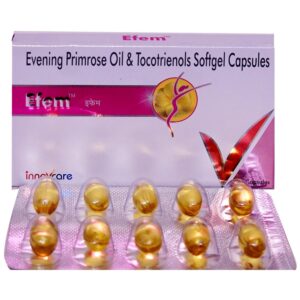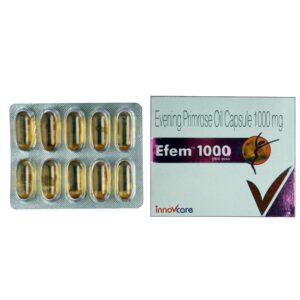TOCOTRIENOLS + EVENING PRIMROSE OIL
Tocotrienols: Tocotrienols are a group of chemicals belonging to the vitamin E family. They are similar to tocopherols but have a slightly different chemical structure. Tocotrienols are primarily found in certain vegetable oils such as palm oil, rice bran oil, and barley oil, as well as in some nuts and seeds.
These compounds have gained attention for their potential health benefits, including their antioxidant and anti-inflammatory properties. They are believed to inhibit the activity of enzymes involved in inflammation and may help protect against oxidative stress-induced damage. Tocotrienols have also been studied for their potential anticancer, neuroprotective, and cholesterol-lowering effects.
Tocotrienols are available in supplement form and are typically taken orally. The recommended dose can vary depending on the specific health condition being treated and the formulation of the supplement. However, typical dosages range from 100 to 400 mg per day.
While tocotrienols are generally regarded as safe, there are limited studies on their specific side effects. However, some individuals may experience mild gastrointestinal symptoms like nausea, stomach cramps, or diarrhea. Since tocotrienols are derived from natural sources, there is a very low risk of toxicity when taken within recommended dosages.
It is important to note that the use of tocotrienols should be discussed with a healthcare professional, especially if you have an existing condition or are taking medications that could potentially interact with the supplement. As with any dietary supplement, it is wise to consult a healthcare provider before starting a new regimen.
Evening Primrose Oil: Evening Primrose Oil is a dietary supplement derived from the seeds of the evening primrose plant, scientifically known as Oenothera biennis. It contains a high concentration of gamma-linolenic acid (GLA), which is an essential omega-6 fatty acid.
Evening Primrose Oil is commonly used for its potential therapeutic effects on various conditions, including eczema, premenstrual syndrome (PMS), breast pain, menopause symptoms, rheumatoid arthritis, and diabetic neuropathy. However, it is important to note that scientific evidence supporting the effectiveness of Evening Primrose Oil for these conditions is limited and further research is needed.
The exact mechanism of action of Evening Primrose Oil is not fully understood. GLA, the active component of the oil, is converted into substances in the body that reduce inflammation and help regulate cell growth and overall body function.
The recommended dose of Evening Primrose Oil varies depending on the specific condition being treated. However, typical doses range from 1 to 2 grams per day. It is usually taken orally in the form of capsules.
While Evening Primrose Oil is generally considered safe, it may cause certain side effects in some individuals. Common side effects include stomach upset, headache, nausea, diarrhea, and rash. It may also interact with certain medications, such as blood-thinning drugs and anticonvulsants.
Pregnant women and individuals with epilepsy or bleeding disorders should consult with a healthcare professional before using Evening Primrose Oil.
It is always advisable to consult with a healthcare professional or pharmacist before starting any new medication, including dietary supplements like Evening Primrose Oil, to ensure it is suitable for your specific medical condition and to avoid potential interactions with other medications.


